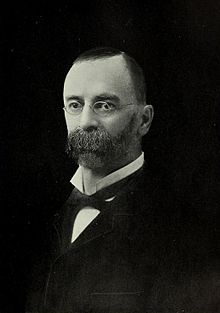Stephen M. Babcock
| Stephen Moulton Babcock | |
|---|---|

Babcock in 1903
|
|
| Born | 22 October 1843 Oneida County, New York |
| Died |
2 July 1931 (aged 87) Madison, Wisconsin |
| Nationality | United States |
| Alma mater |
Tufts College (AB, 1866) Cornell University University of Göttingen (Ph.D, 1879) |
| Known for | the Babcock test for butterfat |
| Scientific career | |
| Fields |
agronomy chemistry |
| Institutions |
New York Agricultural Experiment Station University of Wisconsin–Madison |
| Doctoral advisor | Hans Hübner |
Stephen Moulton Babcock (22 October 1843 – 2 July 1931) was an American agricultural chemist. He is best known for his Babcock test in determining dairy butterfat in milk processing, for cheese processing, and for the "single-grain experiment" that led to the development of nutritional science as a recognized discipline.
Born on a farm in Oneida County, New York, Babcock earned a B.S. from Tufts College in 1866 and attended Cornell University from 1872-1875, where he earned a master's degree before studying organic chemistry at the University of Göttingen, Germany, where he received a Ph.D. in 1879. Upon his return to the United States in 1881, Babcock took up the role of an agricultural chemist at the New York State Agricultural Experiment Station in Geneva, New York, where his first assignment was to determine the proper feed ratios of carbohydrate, fat, and protein using chemical analysis of cow excrement. He determined that the excrement's chemical composition was similar to that of the feed, the only major exception being the ash content. These results were tested and retested, and his results were similar to German studies done earlier. This led Babcock to wonder what would happen if cattle were fed a single grain (barley, corn, or wheat), though that test would not be carried out for nearly twenty-five years.
...
Wikipedia
